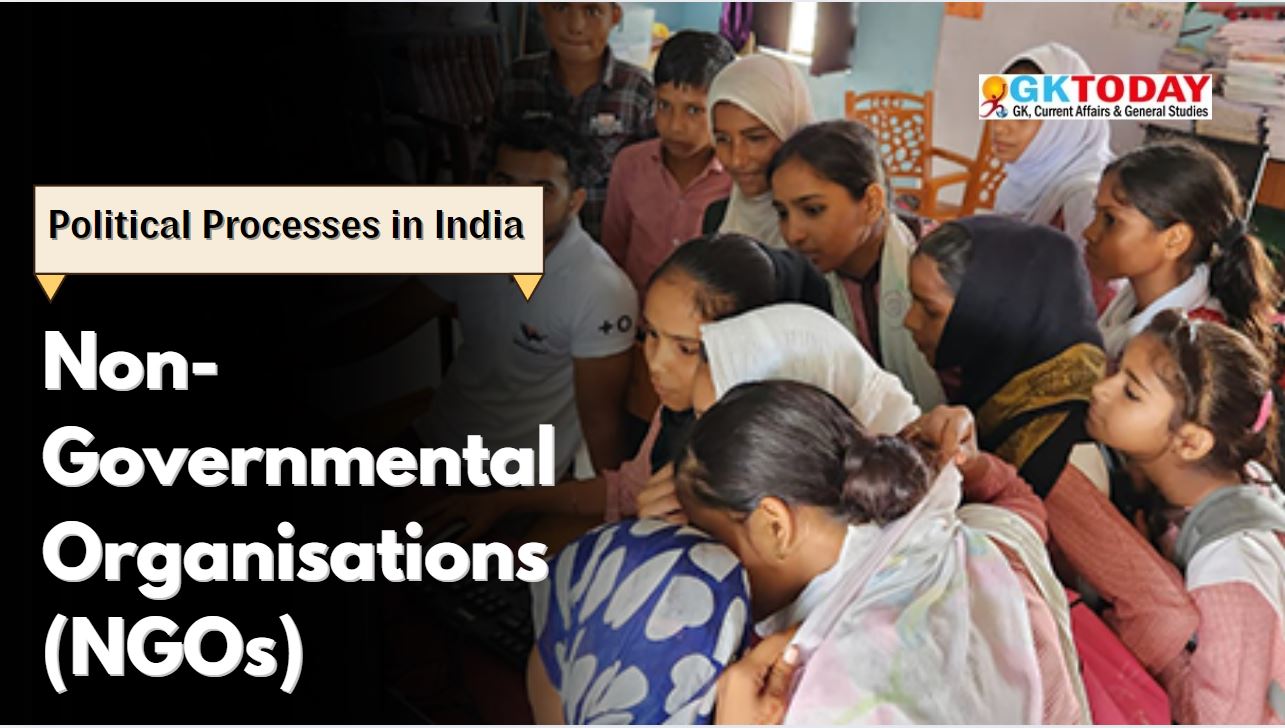Non-Governmental Organisations (NGOs) in India [UGC NTA NET Political Science Notes]
Non-Governmental Organisations (NGOs) play a vital role in India’s civil society. They address various social, political, environmental, and economic issues. Operating independently from government control, NGOs work towards encouraging development and empowering communities.
Definition of NGOs
NGOs are non-profit entities. They function independently of government influence. Their primary aim is to address specific societal issues. Examples include health, education, human rights, and environmental conservation.
Characteristics of NGOs
- Non-Profit: NGOs operate without the intention of generating profit.
- Voluntary: Many rely on volunteers for support and participation.
- Independent: They function autonomously, free from government control.
- Mission-Driven: Each NGO focuses on particular causes or issues.
Types of NGOs
1. Operational NGOs – Focus on project implementation. 2. Advocacy NGOs – Aim to influence public policy. 3. Service NGOs – Provide direct community services like healthcare. 4. Research NGOs – Conduct research and disseminate information.
Functions of NGOs
- Service Delivery: NGOs provide essential services in health, education, and disaster relief.
- Advocacy: They lobby for policy changes and raise awareness on social issues.
- Capacity Building: NGOs strengthen the skills of communities and local organisations.
- Monitoring and Evaluation: They assess government programs to ensure accountability.
Role of NGOs in Civil Society
NGOs act as intermediaries between the government and the public. They empower marginalized communities by amplifying their voices. Furthermore, they promote civic engagement and participation in democratic processes.
Legal Framework for NGOs in India
NGOs in India are governed by several laws: – Societies Registration Act, 1860 – Provides the framework for society registration. – Indian Trusts Act, 1882 – Governs trusts and their operations. – Companies Act, 2013 – Regulates non-profit companies. To receive foreign funding, NGOs must register under the Foreign Contribution (Regulation) Act, 2010.
Funding Sources for NGOs
NGOs rely on various funding sources: – Donations – From individuals, corporations, and philanthropic foundations. – Grants – Provided by government agencies and international organisations. – Membership Fees – Collected from their members. – Self-generated Income – Through services or products offered.
Challenges Faced by NGOs
NGOs encounter several challenges: – Regulatory Hurdles – Complex legal requirements can hinder operations. – Funding Constraints – Dependence on external funding limits autonomy. – Political Pressure – NGOs may face backlash from government or political groups. – Accountability Issues – There is a need for transparency in operations and finances.
Prominent NGOs in India
Several NGOs have impacted various sectors: – Bharat Rural Livelihoods Foundation (BRLF) – Focuses on rural development. – Pratham – Works to improve education access and quality. – Goonj – Addresses urban-rural disparities through resource distribution. – Greenpeace India – Advocates for environmental protection.
Impact of NGOs on Society
NGOs contribute to social change and development. They enhance public awareness and encourage participation in governance. Additionally, they encourage community development and empowerment.
International NGOs in India
International NGOs also play important role: – Oxfam – Works on alleviating poverty and social injustice. – World Wildlife Fund (WWF) – Focuses on conservation and environmental issues. – Save the Children – Advocates for children’s rights and welfare.
Current Trends in the NGO Sector
The NGO landscape is evolving: – Technology Use – Increasing use of technology and social media for advocacy. – Collaboration – Greater partnerships with government and private sectors. – Sustainable Development Goals (SDGs) – Focus on initiatives related to climate change and sustainability.


